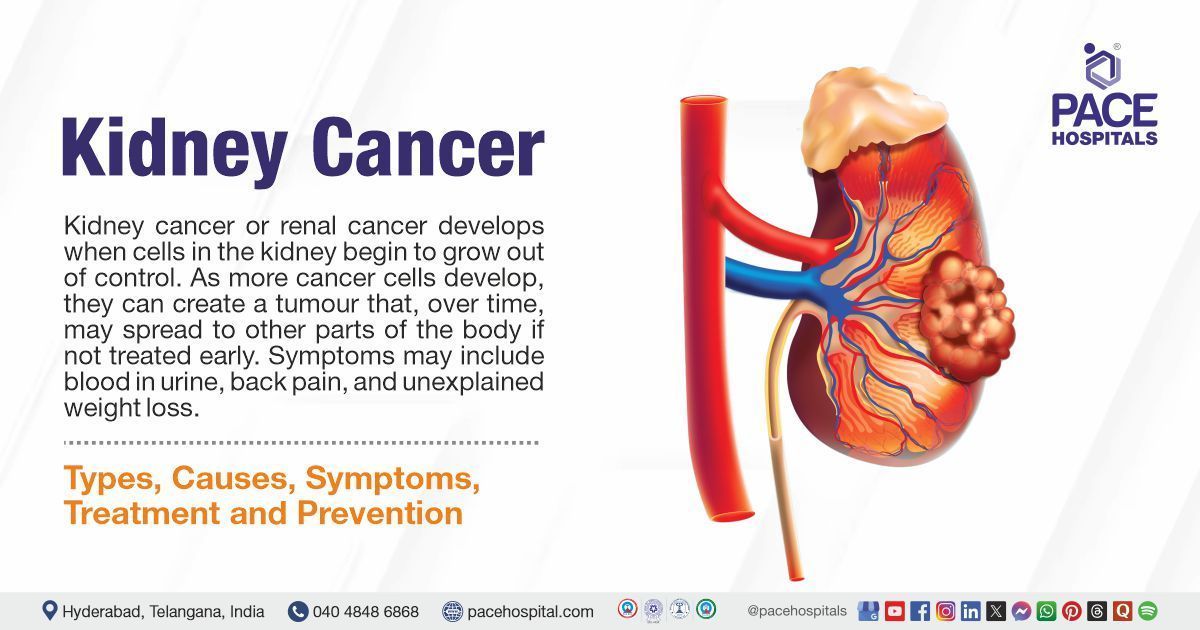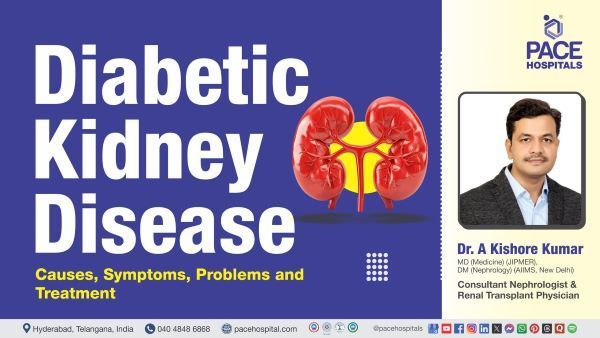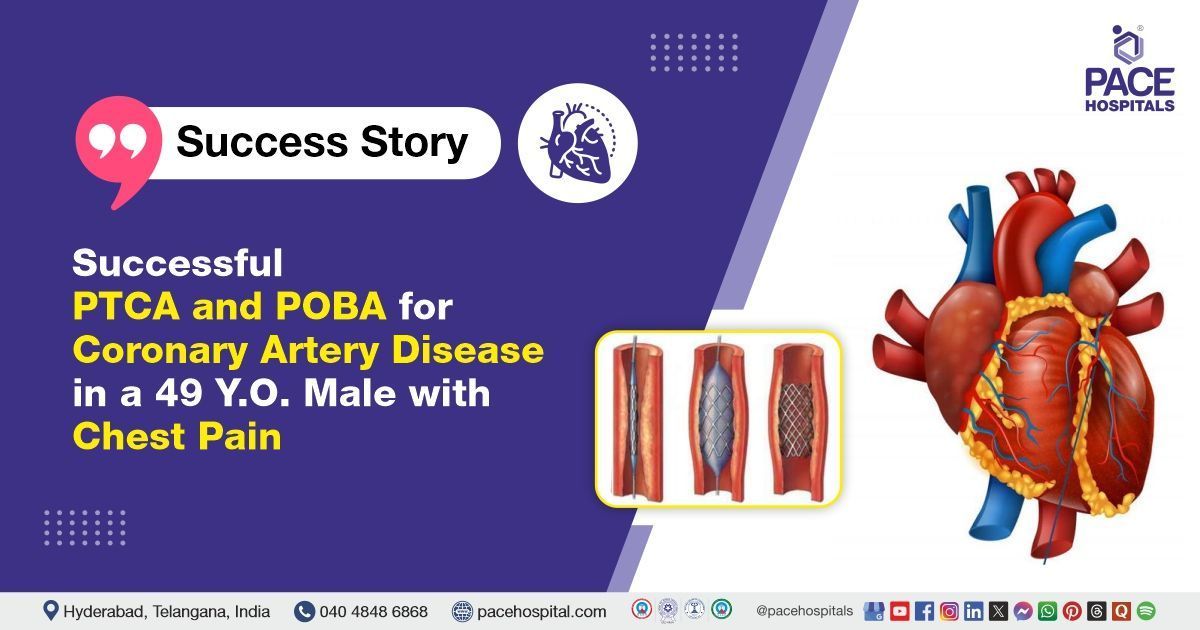Kidney Cancer: Causes, Symptoms, Diagnosis, Treatment & Prevention
Kidney cancer definition
Kidney cancer or renal cancer develops when cells in the kidney begin to grow out of control. As more cancer cells develop, they can create a tumor that, over time, may spread to other parts of the body if not treated early. Symptoms may include blood in the urine, back pain, and unexplained weight loss.
Renal cell carcinoma (also known as hypernephroma or Grawitz tumor) is the most frequent type of kidney cancer, accounting for more than nine out of ten cases in adults. Other forms include transitional cell carcinomas of the renal pelvis, which act similarly to bladder cancer. Renal sarcoma is another type of unusual kidney cancer.
Doctors who treat kidney cancer include, a
urologist, a radiation oncologist, medical oncologist and a
nephrologist.
Kidney cancer epidemiology
kidney cancer statistics worldwide
Kidney cancer is a disease with a rising worldwide incidence estimated at 4,00,000 new cases annually, and a worldwide mortality rate approaching 1,75,000 deaths per year. Current projections suggest the incidence will continue to increase over the next decade, emphasizing the urgency of addressing this significant global health trend.
kidney cancer in India
In India, kidney cancer, also known as renal cell carcinoma (RCC), is considered one of the top ten prevalent cancers, affecting around 2-3% of all cancer cases, with an incidence rate of roughly 2 cases per 100,000 males and 1 case per 100,000 females; the majority of these cases are classified as clear cell renal cell carcinoma, and most patients present at an advanced stage at diagnosis compared to Western populations.
Types of kidney cancer
There are several types of kidney cancer, each with its own set of characteristics. Differences like these affect treatment options and prognosis. Early detection is essential for navigating the most effective management strategies and achieving improved results.
Different types of kidney cancer include the following:
- Renal cell cancer
- Sarcomatoid renal cell cancer
- Upper urinary tract urothelial cancer
- Sarcoma of the kidney
- Wilms tumor
Renal cell cancer
Renal cancer is also known as renal cell adenocarcinoma. It is the most prevalent type of kidney cancer in adults. Renal cell carcinomas account for approximately 80% of all kidney cancers.
Renal cell carcinoma begins with cells in one of the kidney's nephrons. Nephrons filter blood to produce urine. Each kidney has between one and two million nephrons.
Renal cell carcinoma (RCC) is divided into various subtypes, each with its own cellular characteristics and behaviors.
Common types of renal cell carcinoma include:
- Clear cell carcinoma: The most common type, accounting for about 70–80% of RCCs. The cancer cells appear pale or clear.
- Papillary carcinoma: The second most common type, accounting for about 5–10% of RCCs. These tumors have small finger-like projections called papillae.
- Chromophobe carcinoma: A rare type, accounting for about 3–5% of renal cell cancer. The cells are larger than other types of renal cell cancer and can appear pink or clear.
Rare types of kidney cancer
Rare types of renal cell cancer include:
- Cancer of the collecting duct
- Renal medullary cancer - this is also called SMARCB1-deficient renal medullary carcinoma
Sarcomatoid renal cell cancer
Around 5 out of 100 renal cell cancers have sarcomatoid features. This means that some of the cancer cells look like sarcoma cells under a microscope. Sarcomatoid renal cell cancer tends to grow quicker than other types of renal cell cancer. And it is more likely to be diagnosed at an advanced stage.
The symptoms and treatment of sarcomatoid kidney cancer are the same as those for the other types of renal cell cancer.
Upper urinary tract urothelial cancer
Upper urinary tract urothelial cancer previously used to be called transitional cell cancer (TCC) of the kidney or ureter. It starts with transitional cells.
Transitional cells can change shape and stretch. They line the renal pelvis and ureter. The renal pelvis is the area of the kidney where urine collects. The urine then moves into the ureter and down to the bladder.
Sarcoma of the kidney
Sarcoma of the kidney is an uncommon type of cancer that develops in the kidney's connective tissue or blood vessels. It is a soft tissue sarcoma, which means that it originates in the tissue that supports the body, such as muscle, and blood vessels.
The treatment for sarcoma of the kidney is different from the more common types of kidney cancer.
Wilms tumor
Wilms tumor, also known as nephroblastoma, is a rare and malignant kidney cancer that mainly affects children. It is the most frequent kind of renal cancer in children.
Cancer that has spread to the kidney (secondary cancer)
Cancer that originated somewhere in the body can occasionally spread to the kidney. This can happen with lungs, breasts, bowels, and some skin cancers.
Secondary cancers occur when cancer spreads from another part of the body. The cancer cells are identical to the original primary cancer. The treatment is the same as for primary cancer.
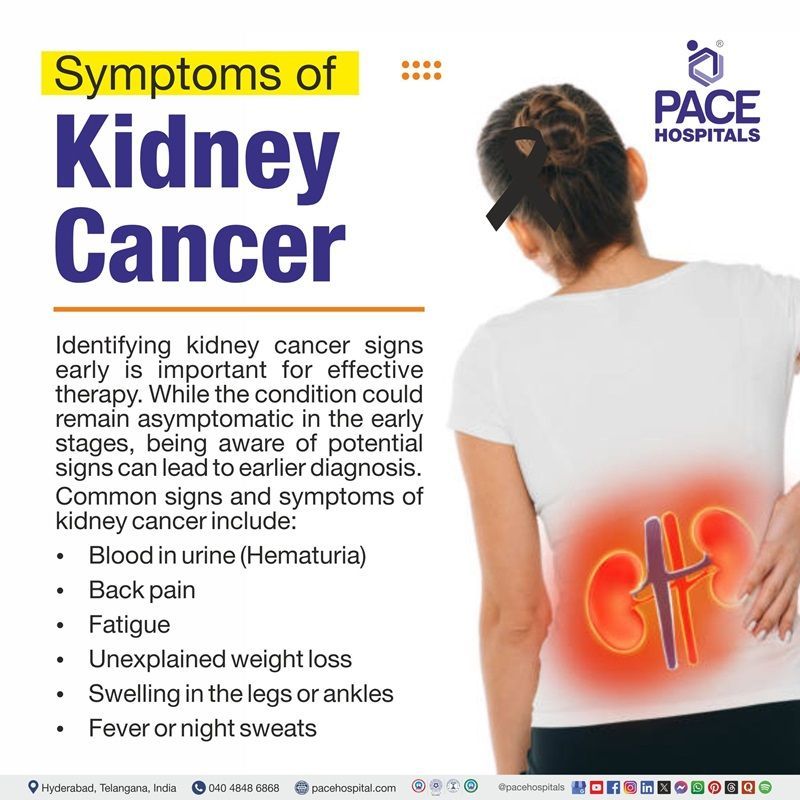
Kidney cancer symptoms
Identifying kidney cancer signs early is important for effective therapy. While the condition may remain asymptomatic in the early stages, being aware of potential signs can lead to earlier diagnosis.
Common signs and symptoms of kidney cancer may include:
- Presence of blood in urine (Hematuria): One of the first signs of kidney cancer, where urine may appear red, pink, or brown.
- Back pain: Persistent lower back pain or side can signal kidney cancer, often due to the tumor pressing against nearby organs.
- Fatigue: Unexplained tiredness or weakness, a common symptom in advanced kidney cancer.
- Unexplained weight loss: Weight loss not related to diet or exercise can be an early indicator of kidney cancer.
- Swelling in the legs or ankles: As a result of fluid accumulation caused by kidney dysfunction.
- Fever or night sweats: A common sign in stage 4 kidney cancer, indicating possible metastasis.
- A lump or mass in the kidney area: Due to the presence of tumor.
Gender-specific symptoms
- Female kidney cancer symptoms: Women may experience abdominal pain, pelvic discomfort, or changes in urinary patterns that can be confused with other issues.
- Male kidney cancer symptoms: Men might experience pain in the groin or testicular area alongside back pain and changes in urinary habits.
Stage 4 kidney cancer symptoms
In stage 4 kidney cancer, symptoms become more severe as the cancer spreads to other organs:
Metastatic kidney cancer symptoms: If the cancer spreads to the bones, lungs, or liver, symptoms can include bone pain, persistent coughing, difficulty breathing, or jaundice.
Early signs and symptoms of kidney cancer
Early kidney cancer symptoms and warning signs can be hard to detect, with some individuals experiencing the first symptoms of kidney cancer like blood in the urine or back pain. However, these early signs often do not cause significant concern until cancer advances.
Kidney cancer causes
Renal cancer causes are not completely known. It is thought that as people age, their risk of developing kidney cancer increases. However, cancer is triggered by mutations in DNA within cells. DNA contains genetic information (genes), which determine how the cells work. Human DNA originates from both parents.
Mutations (changes) in genes
Some genes control when our cells grow, divide to form new cells, fix DNA errors, or cause cells to die when they should. If these genes don't function properly, cells can grow out of control. For example:
- Genes responsible for cell division, growth, and survival can become oncogenes when they become overly active. These genes can cause cells to proliferate uncontrollably.
- Tumor suppressor genes generally help in regulating cell division or trigger timely cell death. Cells may proliferate uncontrollably if these genes are altered.
- Some genes are responsible for repairing DNA errors in cells. Turning off DNA repair genes can cause an accumulation of mutations within a cell, potentially leading to uncontrollable growth.
Changes in multiple genes usually cause kidney cancer. These mutations (changes) may be inherited from parents or acquired over time.
Inherited gene mutations
Kidney cancer risk can be increased by certain inherited gene mutations that run in some families.
Acquired gene mutations
Some gene mutations occur throughout a person's lifetime and are not passed on. They only impact cells derived from the original altered cell. These changes are known as acquired mutations. Most people with kidney cancer acquire the gene abnormalities that cause cancer rather than inheriting them.
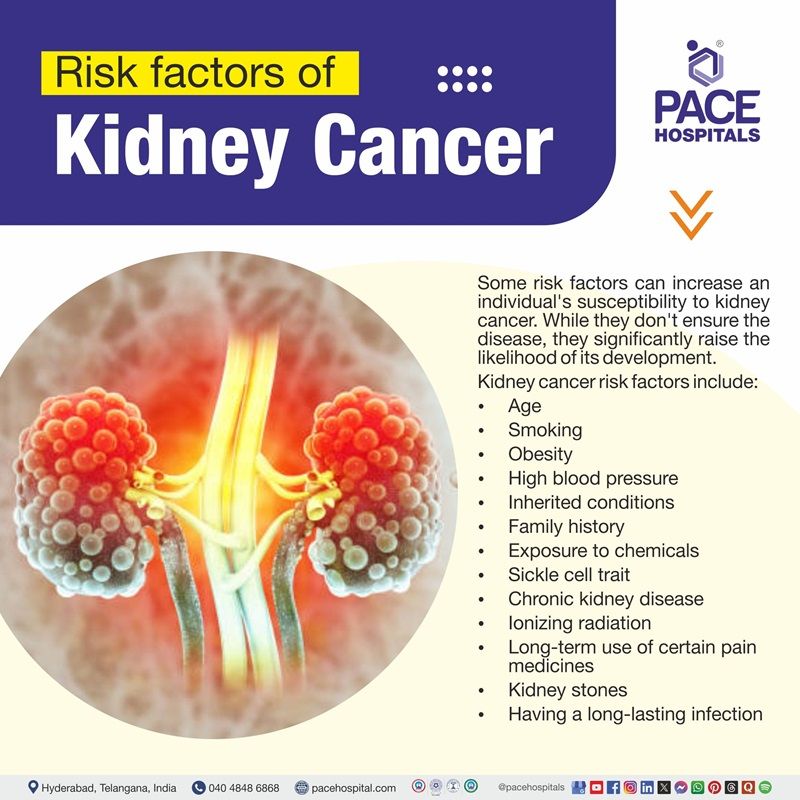
Renal cancer risk factors
Some risk factors can increase an individual's susceptibility to kidney cancer. While the risk factors do not directly cause the disease, they significantly raise the likelihood of kidney cancer development.
Kidney cancer risk factors include:
- Age
- Smoking
- Obesity
- High blood pressure (Hypertension)
- Inherited conditions
- Family history
- Exposure to chemicals
- Sickle cell trait
- Chronic kidney disease
- Ionizing radiation
- Long-term use of certain pain medicines
- Kidney stones
- Having a long-lasting infection with hepatitis C
Age: The risk of kidney cancer increases with age. As people age, the risk of developing kidney cancer increases. This is because over time, cells in the kidneys can accumulate genetic mutations due to normal wear and tear, environmental exposures, or lifestyle factors. As people get older, the body's ability to repair DNA damage and control cell growth decreases, allowing for the potential development of cancer.
Smoking: Smoking is a significant risk factor for kidney cancer because the harmful chemicals in tobacco smoke can damage the DNA in kidney cells. These chemicals, such as carcinogens, can cause mutations that interfere with the normal regulation of cell growth and division.
Obesity: Obesity increases the risk of kidney cancer through several mechanisms. Body fat in excess can lead to hormonal imbalances, such as higher levels of insulin and oestrogen, which may promote the growth of cancer cells. Obesity also causes chronic inflammation, which can damage cells over time and contribute to the development of cancer.
High blood pressure (hypertension): High blood pressure may increase the risk of kidney cancer in several ways. Chronic hypertension might damage the blood vessels present in kidneys, leading to impaired kidney function and changes in kidney tissue that may promote cancer growth.
Inherited conditions: Some inherited conditions, like von Hippel-Lindau disease, can cause kidney cancer.
Family history: Family history of kidney cancer can increase the risk because certain genetic mutations may be inherited that make individuals more prone to developing the disease.
Exposure to chemicals: Exposure to chemicals like asbestos, cadmium, benzene, and trichloroethylene can increase the risk of kidney cancer.
Sickle cell trait: Renal medullary carcinoma is an uncommon type of kidney cancer that is more likely to develop in people with sickle cell trait.
Chronic kidney disease: Having advanced kidney disease, especially if you need dialysis, increases your risk.
Ionizing radiation: Exposure to high energy radiation can increase the risk of kidney cancer.
Long-term use of certain pain medicines: Taking certain classes of pain medicines (NSAIDS) for a long time can increase the potential risk of developing kidney cancer
Kidney stones: Kidney stones themselves do not directly cause kidney cancer, but chronic irritation and inflammation caused by recurrent kidney stones can increase the risk.
Having a long-lasting infection with hepatitis C: Having a long-lasting infection with hepatitis C can increase the risk of kidney cancer indirectly. Chronic hepatitis C infection may cause long-term inflammation in the body, which may affect the kidneys and other organs.
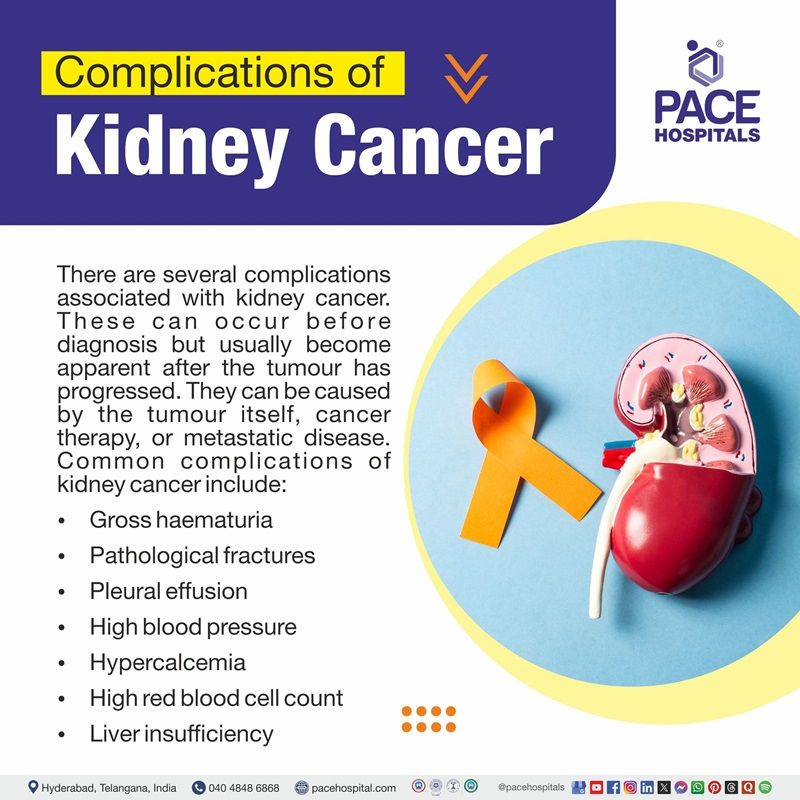
Kidney cancer complications
There are several complications associated with kidney cancer. These can occur before diagnosis but usually become apparent after the tumor has progressed. They can be caused by the tumour itself, cancer therapy, or metastatic disease. Common complications of kidney cancer include:
- Gross haematuria: Blood in the urine is less common as a first symptom of kidney cancer, but it does occur for one-fifth of the population. It can be frightening to suddenly urinate significant amounts of blood, but timely medical attention can usually stop the bleeding.
- Pathological fractures: When cancer spreads to the bone, it weakens it and can cause fractures with minimal or no damage. These are referred to as pathologic fractures.
- Pleural effusion: When kidney cancer spreads to the lungs or the lining of the lungs, fluid can accumulate between the lungs' membranes (the pleura). A malignant pleural effusion is defined as the presence of cancer cells.
- High blood pressure: As previously stated, kidneys play a crucial part in regulating blood pressure. Kidney cancer can cause persistent high blood pressure, which can be difficult to control.
- Hypercalcemia: A high calcium level in the blood can occur as a result of a paraneoplastic disease or bone disintegration caused by bone metastases (cancer spreading).
- High red blood cell count: Although anaemia is common in the early stages of kidney cancer, some individuals may develop a high red blood cell count (erythrocytosis). This occurs when cancer cells produce a protein that stimulates the bone marrow to produce more red blood cells. An excess of red blood cells can make the blood "thicker" (more viscous), which increases the risk of blood clots, heart attacks, and strokes.
- Liver insufficiency: Kidney cancer can cause hepatic insufficiency as a complication in certain cases, especially if the cancer spreads (metastasizes) into the liver. When kidney cancer spreads, cancer cells enter the bloodstream and can lodge in the liver, interrupting normal function.
Kidney cancer surgery complications
Kidney cancer surgery complications refer to potential risks and issues that may arise during or after the procedure to remove a tumor from the kidney. These complications can include infection, bleeding, and the formation of blood clots.
Nearby organs, such as the liver or intestines, can also be damaged. Other possible complications include kidney dysfunction, which occurs when a section of the kidney is removed, as well as urinary problems such as trouble urinating or infection. Persistent discomfort, lymphatic fluid leakage, and the possibility of recurrence of cancer or spread are additional complications
Kidney cancer diagnosis
The diagnosis of kidney cancer begins with a thorough consultation and history taking, which is essential in guiding the subsequent steps in the diagnostic procedure. Kidney cancer can be difficult to identify early since it usually doesn't present with significant symptoms until it has progressed. Therefore, it is essential for doctors to understand a patient’s medical background, any risk factors, and the symptoms that the patient is experiencing. Here’s a breakdown of the kidney cancer diagnosis process, starting with the consultation.
- Consultation and medical history
- Physical examination
- Blood and urine tests
- Imaging tests
- Biopsy
- Staging the cancer
- Genetic testing and biomarker analysis
Consultation and medical history: When the patient visits the healthcare professionals, the first step is a detailed consultation where the doctor asks about the medical history. This includes the patient’s past illnesses, family history, and any existing risk factors for kidney cancer, such as smoking, obesity, high blood pressure, or a family history of kidney or other cancers.
Physical examination: After gathering the medical history, the healthcare experts will perform a physical examination. The physical exam helps identify any physical signs that may suggest kidney cancer.
Blood and urine tests: Next, the health care provider may advise blood and urine tests to assess kidney function and look for any abnormalities.
- Blood tests: These can check kidney function by evaluating levels of substances such as creatinine and blood urea nitrogen (BUN).
- Urine tests: Urine is tested for blood (hematuria) or unusual proteins. Blood in the urine is one of the key signs of kidney cancer, though other conditions can also cause it. The presence of abnormal proteins or other markers in the urine can provide clues about kidney damage or cancer.
Imaging tests: If kidney cancer is suspected based on the symptoms, medical history, and initial test results, the next step is to perform imaging tests.
Common imaging tests include:
- CT scan (Computed Tomography)
- MRI (Magnetic Resonance Imaging)
- Ultrasound
- X-rays
Imaging tests provide crucial information about the location and size of the tumor, which helps healthcare experts to determine the stage of the cancer and plan the most effective treatment.
Biopsy : In certain cases, a biopsy is required to confirm the diagnosis. Using a fine needle, a tiny sample of tissue is extracted from the tumor during a kidney biopsy. To make sure that the needle is properly positioned, it is usually guided by an ultrasound or CT scan.
Staging the cancer: Once kidney cancer is confirmed, the next step is to stage the cancer. Staging helps to determine how far the cancer has spread and is an important factor in deciding the treatment approach.
Genetic testing and biomarker analysis: In some cases, especially in advanced or aggressive forms of kidney cancer, doctors may perform genetic testing on the cancer cells. This helps identify specific genetic mutations or markers that may affect how the cancer behaves and how it will respond to treatment.
Kidney cancer treatment
Once the patient has been diagnosed and knows the stage of kidney cancer, the general physician may refer the patient to a specialist for treatment, such as a urologist, medical or radiation oncologist, or surgeon. Before beginning treatment, many patients find it helpful to get a second opinion about the diagnosis and treatment plan.
There are various standard treatments for kidney cancer. In most cases, surgery is the primary approach. Even if surgery eliminates the entire tumor, healthcare experts may recommend additional treatments to eliminate any remaining cancer cells that cannot be seen.
Types of kidney cancer treatment may include the following:
- Surgical treatments: For larger or more advanced kidney tumors, surgical treatments are often the primary approach, offering the best opportunity for complete removal and improved long-term outcomes. Types of kidney cancer surgery may include:
- Radical nephrectomy
- Partial nephrectomy
- Laparoscopic or robotic-assisted nephrectomy
- Retroperitoneal lymph node dissection
- Ablation therapies: When surgery isn’t an option or for smaller tumors, ablation therapies offer a less invasive solution to treat kidney cancer. Commonly used ablation therapies for kidney cancer include:
- Radiofrequency ablation (RFA)
- Cryoablation therapy for kidney cancer
- Microwave ablation
- Targeted therapy: Targeted therapies attack specific pathways or molecules that cancer cells use to grow. Drugs commonly used for targeted therapies to manage kidney cancer include:
- Tyrosine kinase inhibitors (TKIs)
- mTOR inhibitors
- VEGF inhibitors
- Immunotherapy: Immunotherapy is the use of drugs that strengthen a person's immune system in order to recognize and destroy cancer cells more efficiently.
- Radiation therapy
- External beam radiation
- Radioembolization
- Active surveillance
- Gene therapy (Experimental): Some experimental therapies are designed to modify the patient's genes or the genes of the cancer cells to stop tumor growth. Gene therapy is still in the research phase and is not widely available for kidney cancer.
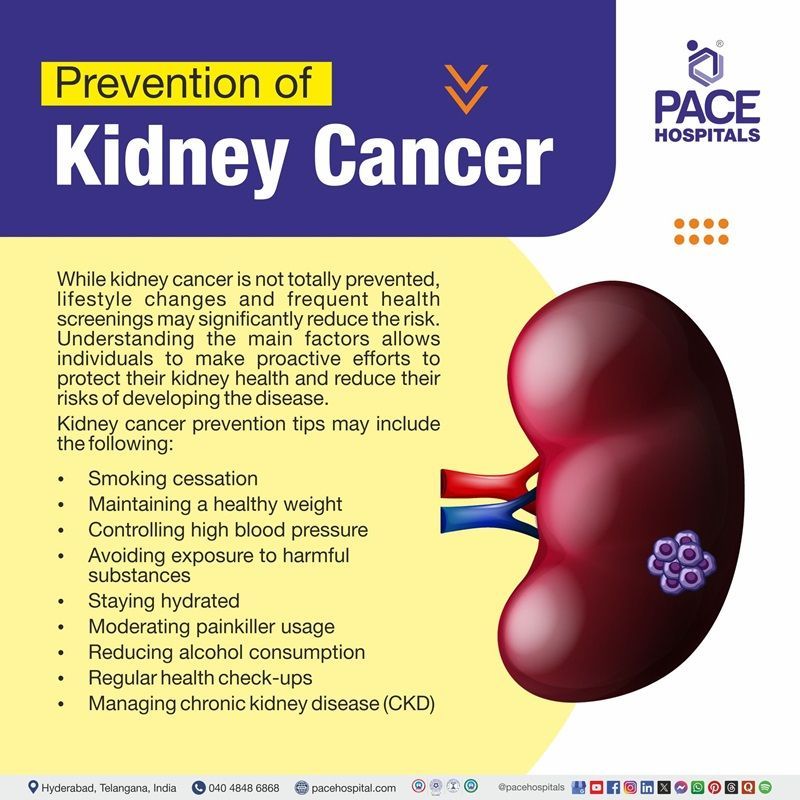
Kidney cancer prevention
While kidney cancer cannot be prevented completely, lifestyle changes and frequent health screenings may significantly reduce the risk. Understanding the main factors allows individuals to make proactive efforts to protect their kidney health and reduce their risk of developing the disease.
Kidney cancer prevention tips may include the following:
- Smoking cessation: Quitting smoking is one of the most effective strategies to minimize the risk of developing kidney cancer. Smoking exposes the body to toxic chemicals that damage kidney tissue and increase the likelihood of cancer. Quitting smoking benefits overall health and significantly decreases the risk of kidney cancer.
- Maintaining a healthy weight: Maintaining a healthy weight reduces the risk of kidney cancer by reducing obesity, which is closely associated with the disease. A balanced diet and regular exercise can improve kidney function, regulate hormones, and minimize the risk of cancer development.
- Controlling high blood pressure: Managing high blood pressure (hypertension) is crucial for preventing kidney cancer because uncontrolled hypertension can damage blood vessels in the kidneys. Maintaining a healthy lifestyle, taking prescribed medications, and controlling blood pressure can help safeguard kidney health and lower the risk of cancer.
- Avoiding exposure to harmful substances: Avoiding exposure to harmful substances, such as industrial chemicals, asbestos, and cadmium, can reduce the risk of kidney cancer. Taking safety precautions at work and using non-toxic household products protect the kidneys from potential cancer-causing agents.
- Staying hydrated: Drinking adequate water supports kidney function and helps eliminate waste substances and toxins from the body. Dehydration can stress the kidneys and affect their ability to function properly, increasing the likelihood of kidney damage and cancer.
- Moderating painkiller usage: Prolonged usage of nonsteroidal anti-inflammatory medicines (NSAIDs) might strain the kidneys. This can cause kidney damage over time, increasing the risk of kidney cancer.
- Reducing alcohol consumption: Drinking too much alcohol can have a severe impact on overall health and is associated with an increased risk of certain cancers, including kidney cancer. Alcohol can contribute to obesity, high blood pressure, and liver disease, all of which raise the risk of kidney cancer.
- Regular health check-ups: Routine health screenings and regular visits to your healthcare experts can help catch kidney cancer early when it is more treatable. If you have a family history of kidney cancer or are at higher risk, your doctor may recommend more frequent screenings.
- Managing chronic kidney disease (CKD): Chronic kidney disease (CKD) is linked to an increased risk of kidney cancer. Chronic kidney disease can be caused by conditions like diabetes and high blood pressure, which, if not managed properly, can damage kidney function and increase the likelihood of cancer.
- Family history and genetic factors: If kidney cancer runs in your family or you have inherited genetic conditions that increase your risk (such as von Hippel-Lindau syndrome), genetic counseling and early surveillance may help with prevention or early detection.
Difference between Kidney cancer and Renal cell carcinoma
Kidney cancer vs renal cell carcinoma
While renal cell carcinoma (RCC) is the most common type of kidney cancer, kidney cancer is a broad term used to describe any malignancy that develops in the kidneys. It is essential to understand the distinctions between these terminologies in order to make an appropriate diagnosis, develop a treatment strategy, and plan patient outcomes. The primary differences between kidney cancer and renal cell carcinoma are described in the following table.
| Aspect | Kidney cancer | Renal cell carcinoma |
|---|---|---|
| Definition | General term for any cancer affecting the kidneys. | A specific type of kidney cancer, the most common form. |
| Types | Includes various types, such as transitional cell carcinoma, Wilms tumour, and RCC | A subtype of kidney cancer, specifically the most common. |
| Origin | It can originate in various kidney tissues (e.g., renal pelvis, renal tubules). | Originates specifically in the renal tubular cells of the kidney. |
| Frequency | Less common; includes a variety of subtypes. | Most common type of kidney cancer, making up 85% of cases. |
| Symptoms | General symptoms like blood in urine, pain, or mass in the abdomen. | Often asymptomatic in early stages; later symptoms include haematuria, flank pain, and a palpable mass. |
| Treatment options | Depends on the type of kidney cancer; may include surgery, chemotherapy, or radiation. | Typically involves surgery (nephrectomy), targeted therapy, or immunotherapy. |
Difference between Kidney cyst and cancer
Kidney cyst vs cancer
Kidney cysts and kidney cancer are two separate kidney-related disorders. Kidney cysts are normally benign, fluid-filled sacs, but kidney cancer is caused by a growth of cancerous cells. The following table illustrates the key differences between kidney cysts and kidney cancer.
| Aspect | Kidney cyst | Kidney cancer |
|---|---|---|
| Definition | A fluid-filled sac that forms on or in the kidney. | A growth of abnormal cells that form a tumor in the kidney. |
| Nature | Benign (non-cancerous) in most cases. | Malignant (cancerous) growth that can spread to other parts of the body. |
| Symptoms | Often asymptomatic; may cause pain or discomfort if large. | Symptoms like blood in urine, flank pain, and weight loss are more common. |
| Size/ shape | Typically, small and round or oval. Can grow larger over time but rarely cause issues. | Can form irregular, larger masses that may invade surrounding tissues. |
| Diagnosis | Detected via ultrasound or CT scan; often incidental finding. | Diagnosed through imaging (CT, MRI) and biopsy to confirm malignancy. |
| Treatment | Often requires no treatment unless symptomatic; sometimes drained or surgically removed. | Typically requires surgery (nephrectomy), and may involve radiation, chemotherapy, or targeted therapies. |
Difference between kidney cancer ablation and Surgery
Kidney cancer ablation vs surgery
Ablation and surgery are the two most widely used treatments for treating kidney cancer. Ablation is a less invasive method that uses heat or cold to remove the tumor, whereas surgery removes the tumor or afflicted kidney. The choice between these treatments is determined by criteria such as tumor size, stage, and patient health. The table below compares kidney cancer ablation with surgery.
| Aspect | Kidney cancer ablation | Surgery |
|---|---|---|
| Definition | A minimally invasive procedure that destroys the tumor using heat (radiofrequency ablation) or cold (cryoablation). | A surgical procedure where the tumour or entire kidney is removed (nephrectomy). |
| Invasiveness | Less invasive; no large incisions are required. | More invasive; requires a large incision or multiple smaller incisions (laparoscopic or open surgery). |
| Recovery Time | Shorter recovery: patients typically return to normal activities within a few days to weeks. | Longer recovery period, often taking several weeks or more depending on the extent of surgery. |
| Suitability | Suitable for smaller tumors (usually <4 cm) or patients who are not candidates for surgery due to age or other health issues. | Suitable for larger tumours or cases where the cancer has spread to the kidney or nearby tissues. |
| Effectiveness | Can be effective for early-stage tumours but may not be as effective for larger or more advanced cancers. | More effective for larger or more aggressive tumors and allows for removal of the entire kidney if necessary. |
| Risks/Complications | Lower risk of complications like infection or bleeding. However, there is a risk that the tumour may not be completely destroyed. | Higher risk of complications such as bleeding, infection, or damage to surrounding organs, especially with major surgery. |
Frequently Asked Questions (FAQs) on kidney cancer
Can kidney cancer be cured with surgery?
Yes, surgery can cure kidney cancer, particularly in the early stages. Surgery is the first choice of treatment for stages 1, 2, and occasionally stage 3 kidney cancer.
What color represents kidney cancer?
The color orange indicates kidney cancer. Orange has been recognized as the official color for kidney cancer awareness. This choice is part of broader efforts to encourage understanding and support for those affected by the disease, just as other types of cancer have specific colors.
The orange ribbon also denotes leukemia, demonstrating a connection in the fight against specific blood and kidney cancers.
Is kidney cancer hereditary?
Yes, kidney cancer can be genetic, but it is unusual. Hereditary kidney cancer is caused by inherited genetic abnormalities that increase the risk of developing renal cancer.
Can kidney cysts be cancerous?
Kidney cysts are fluid filled sacs. These cysts form around the kidneys. Most kidney cysts are harmless and may not cause symptoms. However, in some situations, kidney cysts might be malignant (cancerous).
Is stage 2 kidney cancer curable?
Yes, stage 2 kidney cancer is considered curable with surgery, as most people with early-stage kidney cancer (including stage 2) can be cured by surgical removal of the affected kidney, also known as a radical nephrectomy; however, the type of treatment plan will vary depending on the individual case and should be discussed with a health care expert.
Is kidney cancer dangerous?
Yes. Kidney cancer can be a dangerous disease, owing to its potential for metastasis (cancer spreading) and high mortality rates.
Is there a stage 5 kidney cancer?
No, kidney cancer does not have a stage 5. The stages of kidney cancer are from stage I (1) to stage IV (4), with higher numbers signifying more widespread malignancy.
How often does kidney cancer return?
According to available medical information, kidney cancer, specifically renal cell carcinoma (RCC), can return in approximately 20-30% of patients who have undergone surgery for localized disease, with most recurrences occurring within the first 5 years after surgery; however, a significant portion of patients can experience recurrence even beyond the 5-year mark, sometimes referred to as "late recurrence."
When kidney cancer spreads, it usually first metastasizes (spreads) to adjacent lymph nodes, which are part of the body's lymphatic system, before potentially spreading to other organs like the lungs, liver, bones, or brain.
Dr. Linehan pioneered research on the genetic causes of kidney cancer. His team discovered the genes for the most common types of kidney cancer and then described the pathways of these genes.
Can metastatic kidney cancer be cured?
No, metastatic kidney cancer is usually not curable. However, medicines can help control the malignancy and relieve symptoms.
Are kidney and bladder cancer related?
Although Kidney cancer and bladder cancer affect different parts of the urinary tract. They share certain risk factors and symptoms but have separate diagnostic procedures and treatments.
Can kidney function test detect cancer?
No, kidney function tests (KFTs) cannot directly detect kidney cancer. They can, however, identify signs of kidney disease, which could be suggestive of malignancy.
Which cell is mutated in kidney cancer?
The von Hippel-Lindau (VHL) gene is most frequently mutated in kidney cancer cases, and it is especially linked to the clear cell type of renal cell carcinoma (RCC), which is the most common type of kidney cancer.
What race is more likely to get kidney cancer?
Kidney cancer is twice as common in men as in women, and it is more common in American Indians, African Americans, and Alaska Native people.
What month is observed as kidney cancer awareness month?
Kidney Cancer Awareness Month happens every March. Throughout the month, many organizations and advocacy groups try to increase awareness of kidney cancer, its symptoms, risk factors, and the need for early detection and treatment. The purpose is to educate the public, assist patients, and increase research funding.
What is the prognosis for kidney cancer?
The prognosis for kidney cancer is predominantly determined by the stage at which it is diagnosed, with excellent outcomes for early-stage (localized) kidney cancer, where the 5-year survival rate can be as high as 93%, while advanced (metastatic) kidney cancer has a significantly lower survival rate, around 12-15% depending on the case.
Is kidney cancer detected by ultrasound?
Yes, ultrasounds can detect early kidney cancer. Other imaging tests, like CT scans and MRIs, are also used to detect kidney cancer.
Share on
Request an appointment
Fill in the appointment form or call us instantly to book a confirmed appointment with our super specialist at 04048486868

